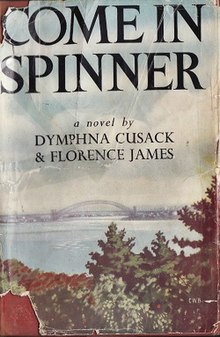Come In Spinner
 First edition (publ. Heinemann) | |
| Author | Dymphna Cusack and Florence James |
|---|---|
| Language | English |
| Genre | Fiction |
| Publisher | Heinemann |
Publication date | 1951 |
| Publication place | Australia |
| Media type | |
| Pages | 416 |
| Preceded by | Pioneers on Parade |
| Followed by | Say No to Death |
Come In Spinner is an Australian novel by Dymphna Cusack and Florence James, originally published in 1951 and set in Sydney at the end of the Second World War.[1]
Name
The title refers to a phrase used in the Australian gambling game of two-up. "Come in spinner" or "Righto, come in spinner"[2] is the call given by the game manager when all bets are placed and the coins are ready to be tossed.[3]
Plot
The book tells the story of three women, Claire, Guinea and Deb, who are co-workers in the beauty salon of an exclusive Sydney hotel. The story weaves together these characters with their familial and romantic relationships, as they struggle to manage the realities of working for the privileged upper classes, to whom no rules apply, while their own families cope with wartime deaths and losses, rationing, government manpower recruitment and stiflingly conservative attitudes surrounding the role and perception of the "acceptable" behaviour of women.
Publication
Cusack and James entered their manuscript in the Daily Telegraph's £1000 novel competition, whose closing date was October 1946. It was judged the winner and the prizemoney handed over, but no announcement was made,[4] and The Telegraph reneged on its commitment to publish the novel, which covered such topics as abortion, adultery, prostitution and rape, as well as promiscuity and the black market. Heinemann published an expurgated version in 1951.[5] The book was reworked from the original MS by Florence James, and was republished in 1987 for Richard Walsh of Angus and Robertson, partly due to the interest caused by the development of a television adaptation of the book. Cusack was not able to take part in this restoration or witness the renewed popularity of the novel as she died in 1981.
Radio adaptation
In 1954 the novel was adapted as a serial for radio. It was popular but controversial, and was axed by 3UZ Melbourne after two episodes[6] due to viewer complaints.[7]
Film and television
In the 1950s, film director Jack Lee expressed interest in making a movie out of the novel.[8]
A mini series was made in 1989. See See Come in Spinner (mini-series)
References
- ^ Austlit – Come in Spinner by Dymphna Cusack and Florence James
- ^ ""Come In Spinner"". Lithgow Mercury. New South Wales, Australia. 6 January 1943. p. 3. Retrieved 20 February 2024 – via National Library of Australia.
- ^ "Two-Up in Posh London Club". Brisbane Truth. No. 2179. Queensland, Australia. 28 December 1941. p. 8. Retrieved 19 February 2024 – via National Library of Australia.
- ^ "The Way I See It". The Sun (Sydney). No. 2402. New South Wales, Australia. 24 April 1949. p. 26. Retrieved 5 February 2023 – via National Library of Australia.
- ^ Wilde, W. H. (1994). The Oxford Companion to Australian Literature (Second ed.). OUP. ISBN 019553381X.
- ^ "Radio Film". The Advocate (Melbourne). Vol. LXXXVII, no. 5149. Victoria, Australia. 1 April 1954. p. 18. Retrieved 5 February 2023 – via National Library of Australia.
- ^ Philp, Peter. Drama in Silent Rooms: A History of Radio Drama in Australia from 1920s to 1970s. Eureka Media Communications. pp. 420–421.
- ^ Douglas Brass (31 October 1952). "London Notebook". The Advertiser. Adelaide, South Australia. p. 2. Retrieved 2 December 2017 – via Trove, National Library of Australia.
External links
- Come In Spinner novel
- "Revisiting the 'Mystery of a Novel Contest': The Daily Telegraph and Come in Spinner". Bridget Griffen-Foley (2000), Australian Literary Studies
